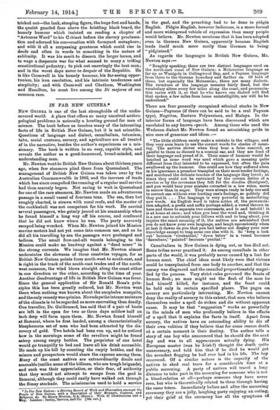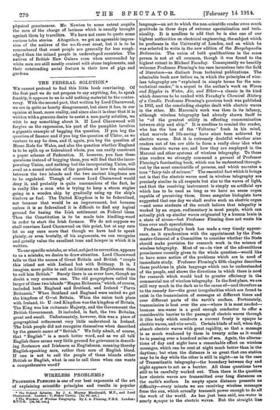IN FAR NEW GUINEA.* NEW GUINEA. is one of the
last strongholds of the undis- covered world. A place that offers so many unsolved anthro- pological problems is naturally a hunting ground for men of science. The book before us touches many of the interesting facts of life in British New Guinea, but it is not scientific. Questions of language and dialect, cannibalism, totemiem, tabu, social customs, sorcery, and agricilture are all treated of in the narrative, besides the author's experiences as a mis- sionary. The book is written in an easy, capable style, and reveals the author as a good-humoured, broad-minded, and understanding man.
Mr. Newton went to British New Guinea about thirteen years ago, when few steamers plied there from Queensland. The management of British New Guinea was taken over by the Australian Commonwealth in 1902, and the increase of trade which has since compelled the running of a regular mail service had then scarcely begun. Not caring to wait in Queensland for one of the rare steamers, Mr. Newton made an adventurous passage in a small vessel of fourteen tons. The sea, then but roughly charted, is strewn with coral reefs, and the master of the cockleshell was not competent for his work. He carried several passengers, who grimly jeered at his seamanship when he found himself a long way off his course, and confessed that he did not know where he was. The party narrowly escaped being wrecked. When Mr. Newton joined his Mission marine motors had not yet come into common use, and as he did all his travelling by sea the passages were prolonged and tedious. The small fore-and-aft vessels belonging to the Mission could make no headway against a "dead nosey" in the strong currents. We imagine that Mr. Newton almost understates the slowness of these coastwise voyages, for as British New Guinea points from north-west to south-east, and is right in the track of the south-east trades and of the north. west monsoon, the wind blows straight along the coast either in one direction or the other, according to the time of year. Another disadvantage of life in British New Guinea was fever. Since the general application of Sir Ronald Ross's prin. ciples this has been greatly reduced, but Mr. Newton went there when nothing was known about the anopheles mosquito, and the only remedy was quinine. Nowadaye the intense moisture of the climate is to be regarded as more enervating than deadly. One traveller, Dr. Guillemard, has said that if a pair of boots are left in the open for two or three days mildew half an inch deep will form upon them. Mr. Newton found himself at Samarel, where he first landed, among a characteristically blasphemous set of men who had been attracted by the die- covery of gold. Two hotels had been run up, and he noticed how in the mornings some of the revellers might be found asleep among empty bottles. The proprietor of one hotel would go tranquilly to bed and leave all his drink accessible. He made up his bill by counting the empty bottles, and the miners and prospectors would share the expense among them. Many of the coast natives are extraordinarily docile and amenable (unlike some of the hiilmen, who are tough brigands), and such was their appreciation, or their fear, of authority that they would not attempt to escape from the gaol in Samurai, although they could easily have walked out through the flimsy stockade. The missionaries used to hold a service • in Far New GidlIte a Stirrinf Record of Work and Ofw•nwtiw• amwy.t 55. Neel& of yhro, Gatsm, with a Dose riptio. of their Maitourrs, Customs, dad It ohrions, de. By Weary Newton. 11.A. (Oxon.). With 47 Illustrations and a Yap. London Seeley, Service, and Co. (Ws. net.]
in the gaol, and the preaching had to be done in pidgin English. Pidgin English, however ludicrous, is a more formal and more widespread vehicle of expression than many people would believe. Mr. Newton mentions that it bus been adopted even in German New Guinea, apparently because English lends itself much more easily than German to being " pidginized."
As regards the languages in Britiah New Guinea, Mr. Newton says :—
"Roughly speaking, there are two distinct languages used on the north-east coast of New Guinea: a Melanesian language as far up as Wanigela in Collingwood Bay, and a Papuan language- from there to the German boundary and farther on. Of both of these, but especially the Melanesian, there see many dialects. The structure of the language remains fairly fixed, but the vocabulary alters every few miles along the coast, and pronuncia- tion varies with it, so that lie who knows one dialect will find that spoken a few miles from home unintelligible, nor will he be understood."
There are four generally recognized ethnical stocks in New Guinea—Papuans (if there can be said to be a real Papuan type), Negritos, Eastern Polynesians, and Malays. In the interior forms of language have been discovered which are unrelated to any known speech. Among those who used the Wedauan dialect Mr. Newton found an astonishing pride in nice nees of grammar and idiom :—
" The little children rarely make a mistake in the villages, and they very soon learn to use the correct words for shades of mean- ing. The natives shiver when they hear a false concord, as painful to them as discord to a musical ear, and they are fond of their language and proud of it. Their sense of humour would be touched as some word was used which gave a meaning quite different from that intended to be expressed, but often the pain swallowed up the humour. One could see how they suffered when in his ignorance a preacher trampled on their most tender feelings, and murdered the delicate touches of the language they loved ; at times they could not be restrained by the solemn duties of a service or by the reverence they felt for the ditndiss (foreigner), and you would bear your mistake corrected in a low voice, more in sorrow than in anger. They were always ready to help remand to correct one without ever hurting one's feelings, so politely did they put it . . . The language is very powerful in assimilating new words. An English word is taken notice of, the pronuncia- tion adapted, a prefix and suffix perhaps added, a vowel thrown in here and there to separate two consonants, and to and behold! it is at home at once ; and when you hear the word and, thinking it ie a new one to astonish your fellows with and to brag about, you inquire the exact meaning of it, the natives are astonished that you do not know your own language, and laugh uproariously when at last it dawns on you that you had better not display your new knowledge except to trap some one else with it. So 'keep a look out' become ' virukautiei,' • down below' in a vessel becomes
• daumbare, 'painted' becomes • penitai."
Cannibalism in New Guinea is dying out, or has died out. Some tribes never practised it. As among cannibals in other parts of the world, it was probably never caused by a lust for human meat. The chief ideas most likely were that virtues could be transplanted from one body to another, and that the enemy was disgraced and the cannibal proportionately magni- fied by the process. Very strict rules governed the feasts of human flesh ; no man might eat the flesh of the man lie bad himself killed, for instance, and the feast could be held only in certain specified places. The pages on sorcery are particularly interesting. Mr. Newton cannot deny the reality of sorcery to this extent, that men who believe themselves under a spell do sicken and die without apparent cause. It may be that "suggestion" works so powerfully in the minds of men who profoundly believe in the effects of a spell that it explains the facts in itself. Apart from sorcery, the natives have an astounding ability to die of their own volition if they believe that for some reason death at a certain moment is their destiny. The author tells is story of one boy who announced that he should die the next day and was to all appearances actually dying. His European master (was he Irish I') thought the death quite unnecessary, and told him that if he died he would get the soundest flogging he bad ever had in his life. The boy recovered. Of a similar nature is the capacity of the natives to shed real tears for a considerable time at a public mourning. A party of natives will travel a long
i distance to take part in the mourning for someone who is not
a blood-relation at all—perhaps someone they have never seen, but who ie theoretically related to them through having the same totem. Immediately before and after the mourning ceremony they are a jolly, laughing party enjoying an outing; yet their grief at the ceremony has all the symptoms of
physical genuineness. Mr. Newton to some extent acquits the men of the charge of laziness which is usually brought against them by travellers, We have not room to quote some curious tuba stories. Altogether, we get an agreeable impres- sion of the natives of the no: th.east coast, but it is to be remembered that coast people are generally far less rough- edged than the inland people in undeveloped countries. The natives of British New Guinea even when surrounded by white men are still mostly content with stone implements, and their outstanding social feature is their love of pigs and gardens.







































 Previous page
Previous page